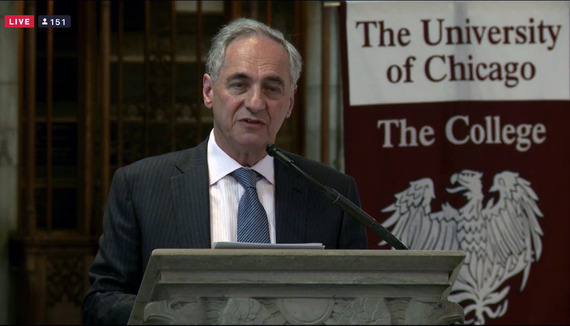It is tempting to use public relations, marketing and ethics to limit free speech. In business, the goals are to serve customers and maximize profits for investors, and free expression may be seen as an obstacle.
The growth of social marketing and PR on U.S. university campuses faced with more competition should not be an excuse, though, to restrict academic freedom and open inquiry. Yet, a desire for campuses to speak with "one voice" inevitably leads to social media policies gone wrong.
Google "university social media policy" and watch 574 million results return. At the top of my search was the University of Houston Social Media Policy.
The front line in the assault on freedom of expression comes in the form of law. Although we are blessed with the First Amendment, the 21st Century legal terrain introduces FERPA, HIPPA and NCAA regulation designed to protect student privacy. The Houston policy follows most across the country in its fear of disrupting the world of big time, big money college athletics:
The world of social media has changed the face of communication and recruiting in collegiate sports and all UH employees are asked to abide by NCAA regulations when interacting and communicating on social media platforms. In addition, we ask that all employees refrain from contacting (Tweeting and friending on Facebook) prospective student-athletes on social media until after they have signed a National Letter of Intent with the school.
Presumably the policy means university employees should not tweet at a specific recruit, and not that they should be blocked as followers on Twitter. The open social media spaces, of course, encourage rather than discourage open communication within a particular context.
Houston, however, is not alone. The University of Wisconsin-Madison also has an explicit social media policy. It draws a bold line between personal and professional use:
It's appropriate to post at work if your comments are directly related to accomplishing work goals, such as seeking sources for information or working with others to resolve a problem. You should participate in personal social media conversations on your own time.
Personal ethics and responsibility is introduced in this reaching statement: "Let your Internet social networking do no harm to the UW-Madison other individuals or to yourself whether you're navigating those networks on the job or off."
Many social media policies provide valuable advice about accuracy, authenticity and respect for others. The Social Media Handbook at Vanderbilt University, for example, has a clear focus on professional social media use best practices: "Limit your personal use of these sites while at work as directed by your department's guidelines."
Many social media policies default to broader university workplace rules in dealing with violations, but the potential suspension or dismissal of faculty under University of Kansas policy led the Association for Education in Journalism and Mass Communication (AEJMC) in 2014 to respond with a presidential statement:
It is not difficult to imagine the chilling effect the new policy will have on freedom of expression in general and academic freedom in particular on university and college campuses in Kansas. Furthermore, social media, and Twitter specifically, have become essential tools in gathering and disseminating news. If Kansas' journalism professors are afraid to teach students how to use these reporting tools because they may violate a vague social media policy, the future journalists they train will be unprepared for the real world of journalism in the digital age.
At the University of Chicago, where my daughter attends, President Robert Zimmer reiterated Monday at Opening Convocation the campus support for freedom of expression and open inquiry.
A 2014 committee report on that campus importantly acknowledged legal and privacy concerns, but added:
...the University may reasonably regulate the time, place, and manner of expression to ensure that it does not disrupt the ordinary activities of the University. But these are narrow exceptions to the general principle of freedom of expression, and it is vitally important that these exceptions never be used in a manner that is inconsistent with the University's commitment to a completely free and open discussion of ideas.
By emphasizing a "fundamental commitment" to debating through open inquiry, the U. of C. does what many campuses do not do. It places responsibility in the hands of the campus community (rather than administrators) to "openly and vigorously" contest opposing views within the mission to educate. Still, even at Chicago, one finds a social media policy within the Employee Handbook that requires communication to "be consistent with the University's policies, standards, and principles and should not denigrate or insult others."
At the University of Nebraska at Omaha, my campus, the emphasis seems to be on branding and online style guides. Employees also must follow NU Regents' bylaws, policies and campus computer use rules.
If universities have trouble guarding free expression, no wonder businesses struggle with social media policies. It is important to remember, though, creating innovative business cultures requires a free flow of ideas online and in the workplace. While protecting business interests, free expression must be a fundamental right that is not suffocated by overly bureaucratic attempts to craft social media policies.

